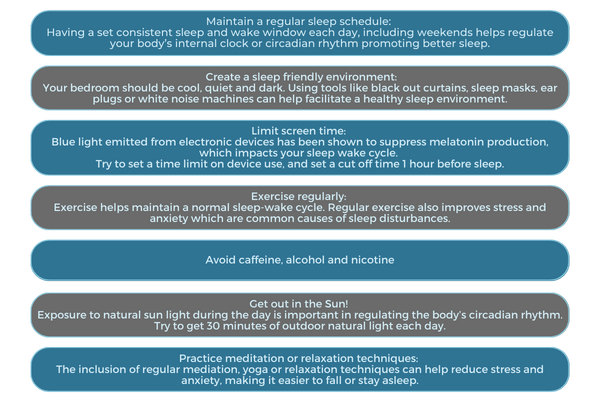Sleep is essential to our physical, mental and hormonal health. We spend 1/3 of our life sleeping, with sleep quality being just as important as sleep quantity. Research has highlighted the crucial role sleep plays in the regulation of hormone levels. Hormones are chemical messengers that play a vital role in the maintenance of bodily functions such as growth and development, metabolism, mood and stress. In particular, cortisol, melatonin and growth hormone are particularly influenced by sleep.
Cortisol: Cortisol is a steroid hormone produced by the adrenal glands that evolutionarily played an important role in protecting the body during an acute stress response. Currently, individuals often experience prolonged periods of stress, and when cortisol levels remain elevated for an extended period of time, individuals may be subject to health consequences. Chronic stress, which can lead to persistently high cortisol levels, has been associated with increased risk for a range of health problems, including cardiovascular disease, diabetes, and depression (Juster et al., 2010; McEwen, 2007). Additionally, high cortisol levels have been linked to decreased immune function, which may increase susceptibility to infections(Cohen, Janicki-Deverts, & Miller, 2007). High cortisol levels have also been associated with cognitive deficits, including impaired memory and executive function (Lupien et al., 2005). These findings underscore the importance of maintaining healthy cortisol levels through stress reduction and good sleep hygiene.
Melatonin: Melatonin is a hormone important in regulating our sleep-wake cycle. It is produced by the pineal gland in response to darkness and is responsible for making us feel sleepy. Beyond its role in sleep regulation, melatonin has also been found to have anti-oxidative and anti-cancer properties. A study by Reiter and colleagues (2016) found that melatonin has strong antioxidant activity that can protect against oxidative stress, which is implicated in the development of several chronic diseases. Additionally, melatonin has been found to have anti-cancer properties through its ability to regulate cell proliferation and apoptosis (Mehrzadi et al., 2021). These findings suggest that melatonin may have important health benefits beyond its role in sleep regulation. More research is needed to fully understand these potential benefits.
Growth Hormone: Growth hormone is a hormone produced by the pituitary gland in the brain. In children and adolescents, this hormone plays a crucial role in growth and development. In adults, it also plays an essential role in the regulation of metabolism, muscle growth and bone density. Research suggests that growth hormone is primarily secreted during deep restful sleep. Therefore, individuals who do not get the required quantity, and or, quality of sleep, may have lower levels of growth hormone. Research suggests that low levels of growth hormone increase the risk of cardiovascular disease, osteoporosis and decreased muscle mass (Gupta, 2015). Alternatively, increasing growth hormone levels positively impact bone density, cognition and mood. The relationship between growth hormones and sleep is complex and multi-faceted, however, it is clear that sleep is important in maintaining healthy levels of growth hormones (Tavares et al., 2013; Olarescu et al., 2018)
Perimenopause, Menopause and Sleep: The hormonal changes during perimenopause and menopause can bring about changes that impact sleep patterns. During perimenopause, the body’s production of estrogen and progesterone decreases, which can cause disruptions in the body’s natural sleep-wake cycle (Harvard Health Publishing, 2020).
Estrogen plays an essential role in sleep regulation, and low levels of this hormone are associated with insomnia and sleep disorders. Estrogen also plays an important role in the regulation of serotonin levels. Serotonin is a neurotransmitter that helps to regulate mood and promote feelings of well-being. Serotonin is also necessary for the production of melatonin, a hormone that regulates sleep patterns (Harvard Health Publishing, 2020).
Progesterone also declines during perimenopause and menopause. This hormone plays a critical role in sleep regulation. Progesterone is known for its calming effects and is responsible for promoting feelings of relaxation and drowsiness. When progesterone levels decrease during perimenopause and menopause, women may experience more difficulty falling and staying asleep (National Sleep Foundation, 2021).
Ensuring adequate and consistent sleep is essential for maintaining a healthy hormonal balance, which, in turn, is essential for optimal physical and mental health.
Here are some tips to improve your sleep and support hormonal wellness:
Shelby Sheppard
Nurse Practitioner


